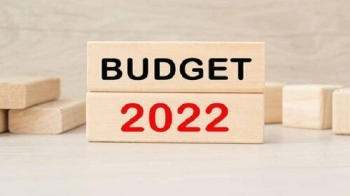
.png) Dr Suresh Mathew
Dr Suresh Mathew

Twenty-four hours before the presentation of the Union Budget for 2022-23, the farmers across the country had observed a ‘betrayal day’ in protest against the Union Government’s failure to fulfil the promises made to them for withdrawing their year-long agitation. The farmers are in for further shock after the Union Finance Minister presented the Budget which hardly offered anything for them to cheer up. Ironically, this year’s Budget coincides with the much-publicised promise of Prime Minister Narendra Modi that the farmers’ income would be doubled by 2022. However, the Budget does not contain a word on it, not even a passing reference to the promise that had warmed the cockles of millions of besieged farmers.
By the time the Finance Minister wound up her 90-minute Budget speech, it became clear that there was more bad news for the farmers and the poor in the country. The fertilizer subsidy has been drastically cut compared to the revised estimates of the previous Budget.
The government has also budgeted for a lower amount for the food subsidy which could have an adverse impact on the public distribution system. It has also dashed the hopes that there would be an increase in the cash transfers to farmers under PM Kisan from the existing Rs 6,000 per year, payable in three installments, thereby pumping in more money in the hands of farmers to increase their purchasing power.
There are several other sectors which are in for a shock after the ‘Amrit Mahotsav’ Budget was presented. One of the last straws for the poor to clutch, Mahatma Gandhi National Rural Employment Guarantee Scheme (MGNREGS), saw a massive slash in its outlay – from Rs. 1,11,700 crore in 2020-21 to Rs. 73,000 crore. When jobs are missing, both in organized and unorganized sectors, it is the rural job scheme that has come to the rescue of the starving people; in fact, any sensitive and sympathetic government would have hiked the budget amount for the scheme which helps millions of poor people to lit the stoves in their houses.
There is an ongoing discussion on spending a higher percentage of GDP on health and education which presently is around 1.8 per cent and 3 per cent respectively. This is abysmally low compared to the WHO’s recommendation of 5 per cent of GDP on health sector and the National Education Policy recommendation of 6 per cent on education. Belying all expectations, this year’s Budget too has not made any effort to rectify this vital anomaly. Similar is the case with providing tax relief to the middle-class people. Despite the ruling party leaders’ promise, in 2014, to raise the tax exemption limit to Rs. 5 lakhs, none of the budgets, including the present one, of the Modi government has made any move in this direction. Thus, the Budget has failed to do justice to the ruling party’s own avowed promises and failed to live up to the yardsticks for development.
However, one has to take into account some of the measured steps the government has taken to increase spending by hiking the capital expenditure to boost infrastructure in some of the core areas. This, the government feels, will lead to more employment generation and revival of the economy. However, without leaving more money in the hands of the people to spend, it is doubtful whether the intended stimulation of economy would take place.